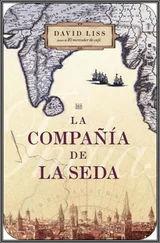Why should she not summon Miguel to speak with her? She had never done so before, but Hannah could not see that there was anything improper in having friendly relations with her husband’s brother. Daniel would be at the Exchange, and he needn’t know anything of it, even if it were improper, which it was not. And of course she could count on Annetje’s silence. The maid, if she had betrayal on her mind, had far deeper wells from which to draw.
Miguel entered, dressed in his austere Dutch attire, and bowed slightly. His eyes were sunken and the skin below them dark, as though he hadn’t slept in days.
“Yes, senhora?” he said, in a voice that managed to be both weary and charming. “You honored me with a summons?”
Annetje stood behind him and grinned like a bawd.
“Girl,” Hannah said to her, “fetch me my yellow cap. The one with the blue stones.”
“Senhora, you have not worn that cap in a year’s time. I cannot say where it is.”
“Then you had better start looking,” she answered. She would hear about that later. Annetje would lecture her, tell her mistress it was wrong to speak to her so, threaten and tease her. But Hannah would face those problems when they arose. For now, Annetje would not dare disobey in front of Miguel.
“Yes, senhora,” she replied, in a convincingly subservient tone.
“It is best to give her a task so she does not spend her time at keyholes,” Hannah said.
Miguel took a seat. “She is a well enough girl,” he answered absently.
“I’m sure you know best.” Hannah felt herself redden. “I must thank you for taking the time to sit with me, senhor.”
“It is I who should thank you. Conversation with a charming lady will pass the time far more amiably than will books and papers.”
“I had forgotten that you have those things available to you. I had thought you must be sitting alone and in silence, but your learning frees you from dullness.”
“I’ve thought it must be terrible not to read,” he said. “Is it a loss you feel?”
Hannah nodded. She liked the softness in his voice. “My father thought learning improper for me and my sisters, and I know Daniel thinks the same, should we have a girl child, even though I have heard the rabbi, Senhor Mortera, say that a daughter may engage in learning for which the wife has no time.” She lifted her hand, to place it upon her abdomen, but then changed her mind. She had become conscious of growing big, of the swelling pressing against her gown, and while it was a sensation that usually comforted her, she did not want Miguel to think of her as nothing more than a woman growing big with child.
“They say it is not so among the Tudescos,” she continued, half afraid that she prattled like a fool. “Their women learn to read, and they are given holy books translated into the common tongue. I think that way is better.”
A strange thrill shot through her body, as though she had just thrown herself off a bridge or before a speeding cart. Never before had she dared to say such things aloud. Miguel was not her husband, of course, but he was her husband’s brother, and for now that seemed to her dangerous enough.
He stared at her. At first she thought she saw anger, and she pressed herself into her chair in preparation for the sting of rebuke, but she had misread him. His eyebrows raised slightly, a little smile upon his lips. She saw surprise, amusement too, and maybe even delight.
“I had never thought you had such opinions. Have you discussed them with your husband? He might very well permit some learning.”
“I have tried,” she told him, “but your brother does not wish to hear me speak on matters of which I know nothing. He asked how I can have an opinion on something of which I am entirely ignorant.”
Miguel erupted into a raspy laugh. “You cannot fault him for his logic.”
Hannah reddened, but after an instant she realized that Miguel mocked not her but Daniel, and so she joined him, and together they laughed at her husband.
“May I ask a favor of you?” she said, and then squirmed uncomfortably at the sound of her own words. She had thought to wait longer before mentioning it but found she grew impatient and nervous. Best to have it said.
“Of course, senhora.”
“May I once again try that coffee-tea you let me drink before?” What else could she do? She dared not steal any more of Miguel’s diminishing supply, and she had eaten all the fruit she’d taken. Besides, now that she knew that it was supposed to be a drink and not a food, she did not think there would be as much pleasure in grinding down the berries with her teeth.
Miguel smiled. “It would be my great pleasure, so long as you recall my request of your silence.” Then, without waiting for her reply, he rang the bell for Annetje, who appeared too rapidly to have been searching through Hannah’s trunks. She allowed her eyes to lock with Hannah’s, but Miguel alone spoke to her, reminding her of how to prepare the drink. When the girl left, Hannah could feel her face turn hot, but she was almost certain that Miguel did not notice-or that he was most adept at pretending not to notice, which was nearly as good.
Hannah burned in the heat of his attention. He smiled at her; he met her eyes; he listened when she spoke. This is what it would be like to have a husband who loved her, she thought. The women in stage plays must feel thus when they talked to their loves.
Still, she knew it was but fantasy. How long could she talk with him? How long before a clever man like Miguel recovered from his stumble and moved into his own house, leaving Hannah alone with her husband? Not alone, of course. There would be, God willing, her child, and her child-her daughter-would be her salvation.
“Were you to marry again and have children,” she asked, “would you allow your daughters to learn?”
“I must be honest with you, senhora, and tell you that I have never thought about it. I always assumed your sex cared nothing for learning and was happy to be spared the pains of study, but now that you tell me otherwise I would look at the matter with new eyes.”
“Then you and I are of a mind.”
After moving to Amsterdam, Daniel had been busy with his studies, learning the ancient tongue and the Law, and Hannah thought she should do the same. If she was a Jew, she should know what it meant to be a Jew. She could not know how her husband might respond to such a thing, but she had hoped he would warm to her display of interest. She considered the wording for days, playing out conversations in her mind. Finally, one Shabbat night, after they had engaged in the mitzvah of marital relations, she decided she should never find her sleepy and sated husband in a more receptive mood.
“Why have I not been taught the Law, senhor?” she asked.
There was only a vague hastening of his breath.
“I have thought,” she continued, speaking hardly above a whisper, “that I too might learn to read and understand Hebrew. And perhaps I might learn to read Portuguese too.”
“Perhaps you might learn to transform rods into serpents and to part the waters of the sea,” he had answered, rolling away from her.
Hannah lay there, afraid to move, gritting her teeth with anger and shame. He must have felt some remorse for dismissing her, for a few days later, when he returned home in the evening, he pressed into her hands two silver bracelets.
“You are a good wife,” he said to her, “but you must not wish for more than what belongs to a wife. Learning is for men.”
“It must be,” she now said to Miguel, “that learning is not forbidden to women, else the Tudescos would not allow it, for they have the same Law, do they not?”
“It is not forbidden,” Miguel explained. “I am told that there have even been great Talmudists among the ladies in times past. Some things belong to Law, and some things belong to custom. It is written that a woman may be called to the Law, but her modesty ought to forbid her from answering. But what is modesty?” he asked, as though puzzling out the question himself. “These Dutch-women know nothing of it, and yet they do not feel immodest.”
Читать дальше












